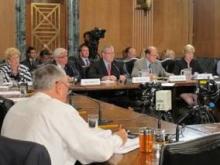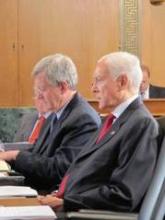The question of what to do about Medicare’s Sustainable Growth Rate formula, which governs physician pay, likely got its final serious look on Capitol Hill on July 11–that is, before Congress heads out the door for a protracted summer recess and then gets caught up in the fall campaign season. And it wasn’t much of a look.
The Senate Finance Committee held its third and final “roundtable” discussion on the SGR, this time allowing physicians to weigh in. Representatives from the American Medical Association, American Academy of Family Physicians, American College of Surgeons, American College of Cardiology, and American Society of Clinical Oncology politely answered questions from committee members who showed up. Most of the Democrats on the committee sat in, at least for a portion of the almost two-hour meeting, while only two Republicans attended–John Kyl (Ariz.) and John Thune (S.D.), who came for only the last half hour.
The discussion meandered quite a bit and quite often, with physicians talking about the need for aligning incentives, creating medical homes, and rewarding quality. Dr. W. Douglas Weaver, a past president of the ACC and current Vice President and Systems Medical Director of Heart and Vascular Services, Henry Ford Health System in Detroit, said that the instability caused by the ever-fluctuating SGR situation was thwarting efforts to create new delivery systems.
But there was little concrete discussion of what to do to avert the 27% cut mandated by the SGR that will take effect January 1, 2013.
Senator Max Baucus (D-Mont.), who chairs the Finance Committee and led the roundtable, at one point said that while he was hearing great ideas, he wanted to know what action could be taken quickly. Senator Kyl also tried to steer the discussion back to the practical. He also reminded physicians that Congress is driven by 10-year budget-setting imperatives; thus, any suggestions for the SGR proposed for the short term must also work over the long haul, he said.
The elephant in the room: how to pay for an SGR fix or replacement, now clocking in at about $300 billion and rising. Physicians have steered clear of suggesting any financial solutions.
The committee broke with no promises. In an interview afterwards, Dr. Glen Stream, AAFP president, said that any SGR tinkering would likely be put off until at least after the November election. That puts the onus on a lame duck Congress.
Do you think they will make a short term fix or come up with some kind of permanent solution?
–Alicia Ault (@aliciaault on twitter)



